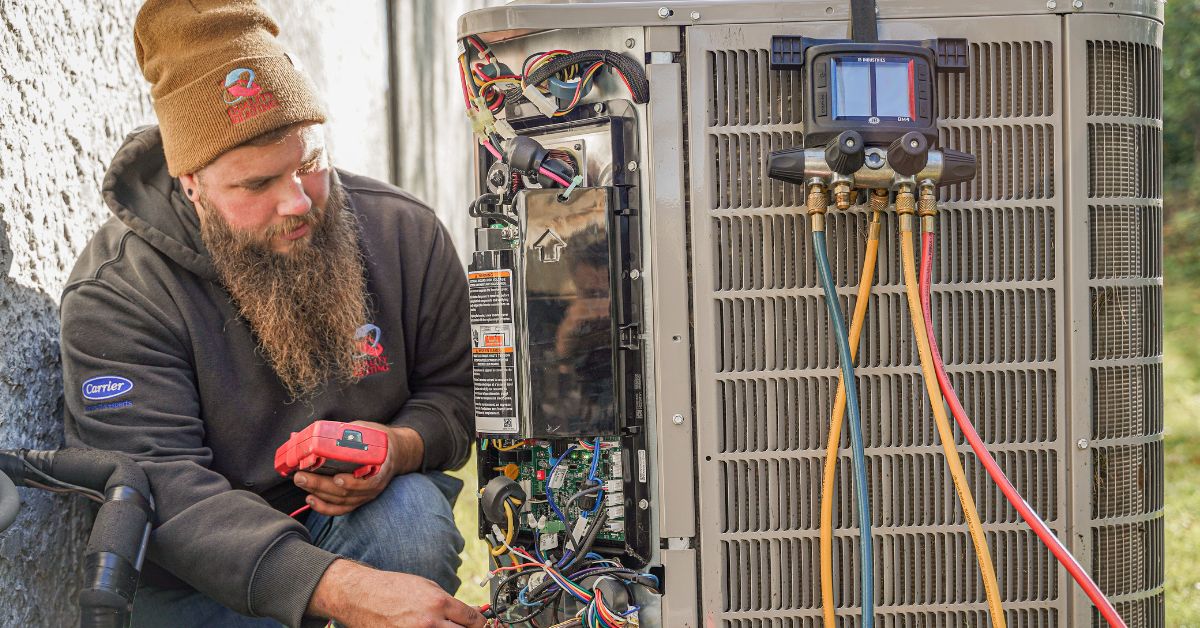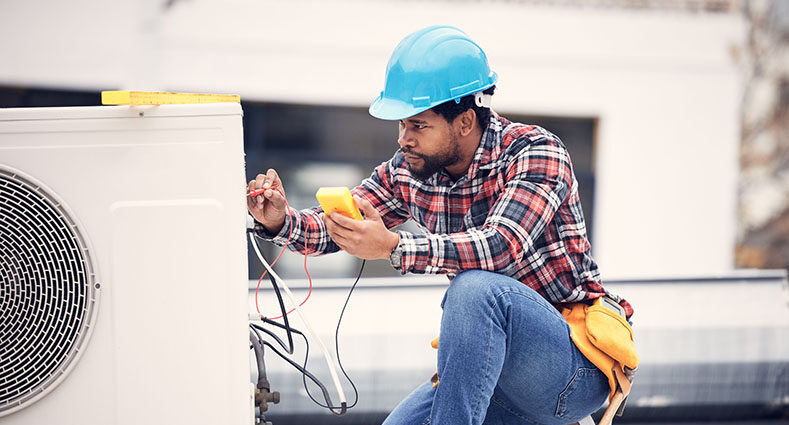Everything about A/c: Identifying Common Issues and Effective AC Repair Approaches
A/c systems are critical for keeping indoor comfort. Comprehending their components and functionality is essential for recognizing common issues. House owners often deal with issues such as inadequate air conditioning, weird odors, or rising energy expenses. These indicators can show underlying concerns that may require attention. Checking out DIY troubleshooting methods can be valuable, but knowing when to seek expert assistance is just as essential. What steps can be taken to ensure long-lasting performance?
Comprehending Your Heating And Cooling System: Parts and Capability
A heating and cooling system, often thought about the foundation of interior environment control, includes numerous key elements that interact to control temperature level and air quality. The key elements include the home heating unit, air flow system, and cooling device. The home heating device, generally a heating system or boiler, generates heat throughout chillier months, while the cooling device cools indoor rooms during the summer.

Common A/c Troubles Home Owners Encounter
Property owners often face several typical cooling and heating troubles, consisting of irregular temperature distribution throughout their living areas. In addition, uncommon noises throughout procedure can indicate underlying problems that need interest. Addressing these issues immediately is crucial for maintaining perfect system performance.
Irregular Temperature Distribution
Several families experience the aggravating issue of irregular temperature circulation, where specific rooms really feel uncomfortably cozy while others remain too cold. This trouble commonly develops from a range of aspects, consisting of bad insulation, obstructed vents, or an improperly sized heating and cooling system. When ducts are not effectively secured or when furniture blocks air movement, some spaces might obtain not enough air conditioning. In addition, thermostat placement can considerably affect temperature level guideline; a thermostat located in a sunlit location may misstate the overall temperature of your house. Normal maintenance, consisting of cleaning filters and making sure ductwork is clear, can aid ease these discrepancies. House owners may additionally consider zoning systems to much better control temperatures throughout various locations of the home, promoting an extra comfortable living atmosphere.
Uncommon Sounds During Operation
When an a/c system runs, uncommon sounds can indicate underlying issues that call for attention. House owners may run into a range of audios, such as grinding, squeaking, or hissing. Grinding noises often indicate worn-out bearings or elements, while squeaking can recommend loose belts or parts needing lubrication. Hissing may indicate a cooling agent leak, which can endanger the system's effectiveness. Furthermore, banging sounds could direct to loosened ductwork or a problem with the blower fan. Each of these sounds acts as a caution, triggering property owners to investigate additionally. Disregarding these indicators can result in even more significant troubles and costly repair services. Regular upkeep and timely interest to uncommon sounds can boost system durability and efficiency, guaranteeing a comfy living setting.
Indications That Indicate Your AC Requirements Repair
How can one inform if their a/c system is in need of fixing? Numerous indications may show underlying problems needing expert attention. If the Air conditioning fails to cool down the space successfully, it might recommend a refrigerant leak or compressor breakdown. In addition, an increase in power bills without matching usage changes can signal ineffectiveness in the system. Homeowners should likewise look out to uncommon scents rising from the system, which might suggest mold growth or electrical issues. Furthermore, if the air conditioning often cycles on and off, it might be a sign of a defective thermostat or other mechanical troubles. The visibility of water merging around the unit can suggest a clogged up drain line. Acknowledging these indicators early can save time and money, ensuring that the a/c system runs efficiently and efficiently.
Do It Yourself Troubleshooting Techniques for Cooling And Heating Issues
When dealing with cooling and heating problems, property owners can use numerous do it yourself fixing methods to determine the problem. Key methods include examining thermostat settings, inspecting air filters, and examining drainage problems. These actions can assist pinpoint common malfunctions prior to seeking expert assistance.
Examining Thermostat Settings
What actions should homeowners require to guarantee their thermostat settings are right? Initially, they ought to confirm the thermostat is set to the wanted temperature level and mode, whether heating or air conditioning. Checking for a clear display and validating the thermostat is not established to "hold" or "trip" setting is essential. Property owners need to also verify that the thermostat is degree and installed in a location free from drafts, direct sunlight, or various other temperature level influences. Additionally, rectifying the thermostat can assist supply precise readings. If the thermostat operates batteries, replacing them may solve any type of problems. By systematically reviewing these factors, home owners can usually determine and remedy thermostat-related issues, advertising excellent HVAC system efficiency.
Inspecting Air Filters
Air filters play an essential duty in maintaining suitable cooling and heating efficiency. They catch dust, irritants, and various other fragments, making certain tidy air flow. With time, filters can come to be stopped up, reducing airflow and performance. To inspect air filters, individuals must first situate the filter, usually located in the return duct or near the heater. When located, they click here should evaluate the filter's problem-- if it appears unclean or tarnished, it most likely needs substitute. The majority of filters need transforming every 1-3 months, depending on use and ecological aspects. Routine inspection and timely replacement of air filters not only enhance air top quality but also lengthen the lifespan of cooling and heating systems, protecting against possible malfunctions and expensive fixings.
Examining Water Drainage Issues
Just how can home owners efficiently identify and resolve water drainage issues within their heating and cooling systems? First, they need to inspect the condensate drain line for obstructions or obstructions, which can lead to water buildup. Homeowners might use a wet/dry vacuum cleaner to remove any kind of debris obstructing the line. Next off, checking the drain frying pan for rust or leaks is essential, as a damaged pan can trigger water to overflow. Regular cleaning of the drainpipe line with a combination of vinegar and water assists prevent future obstructions. Additionally, making certain correct incline of the drain line promotes reliable water flow. If these DIY techniques do not resolve the issue, speaking with a professional HVAC technician might be needed to prevent potential water damage and system failing.
When to Call a Specialist for AC Fixings

While some a/c problems can be dealt with with do it yourself approaches, there are scenarios where calling a professional becomes necessary. Home owners must look for experienced aid when they come across consistent issues, such as insufficient air conditioning, weird sounds, or uncommon odors originating from the system. These signs and symptoms might suggest much deeper problems that require specialized expertise and tools to diagnose and fix properly.

Preventative Upkeep Tips for HVAC Long Life
Normal preventative upkeep can substantially improve the durability of HVAC systems. Homeowners need to set up yearly evaluations by certified technicians to assess system performance and determine prospective concerns. Frequently changing or cleaning air filters is essential, as this guarantees proper airflow and lowers stress on the system. Additionally, inspecting and sealing ductwork stops power loss and enhances total performance.
It is additionally a good idea to maintain the outside device clear of debris and plants, permitting peak air movement and warm exchange. Property owners should check the condensate drainpipe for blockages to stay clear of water damages and mold and mildew growth. Furthermore, keeping suitable thermostat settings and making use of programmable alternatives can improve power performance. Ultimately, recording upkeep tasks helps track solution history and can help in recognizing reoccuring concerns (ac unit replacement). By adhering to these preventative procedures, individuals can optimize the effectiveness and lifespan of their HVAC systems
Regularly Asked Questions
Just how Usually Should I Change My A/c System Filters?
Cooling and heating system filters must hvac thermostat normally be replaced every one to 3 months, relying on use, filter kind, and ecological aspects. Routine replacement assists keep performance and air top quality, ensuring peak click here system efficiency throughout the year.
What Dimension Heating And Cooling System Do I Required for My Home?
To identify the ideal heating and cooling system dimension for a home, one must think about square video, insulation top quality, and local environment. Consulting a specialist can aid ensure optimal performance and comfort for the particular living area.
Exist Eco-Friendly Heating And Cooling Options Available?
Yes, eco-friendly HVAC alternatives are offered, including energy-efficient heatpump, solar-powered systems, and geothermal heating. These alternatives reduce energy intake and ecological effect, advertising sustainability while preserving reliable environment control for household and business spaces.
How Can I Improve My HVAC System's Power Effectiveness?
To improve heating and cooling energy efficiency, one can regularly maintain the system, seal air leaks, install programmable thermostats, use energy-efficient filters, and warranty adequate insulation throughout the home to reduce energy consumption and enhance performance.

What Is the Average Life-span of a HVAC System?
The typical life expectancy of a heating and cooling system commonly varies from 15 to 25 years, depending on aspects such as maintenance, use, and the quality of installment. Regular maintenance can substantially expand its functional long life.
Final thought
In recap, a complete understanding of heating and cooling systems encourages property owners to recognize common problems and address small issues effectively. Acknowledging indications of breakdown, utilizing DIY fixing techniques, and prioritizing regular maintenance can enhance system performance and performance. Nonetheless, when encountered with complex repair work, enlisting professional aid is important to ensure safety and security and long life. By fostering understanding and proactive treatment, people can enjoy a comfortable indoor atmosphere while lessening unexpected expenses connected with heating and cooling failings.